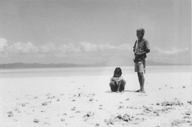Basal Banar—Sacred Ritual of Truth
 PALAWAN-THE PHILIPPINES / 2002 / Palawanon, Filipino / Color / 16mm / 120 min
PALAWAN-THE PHILIPPINES / 2002 / Palawanon, Filipino / Color / 16mm / 120 min
Director, Script, Narrator: Auraeus Solito (Kanakan-Balintagos)
Photography: Regiben Romana (Matang Araw)
Editing: Regiben Romana, Auraeus Solito
Sound, Time-lapse Animation, Production Management: Ellen Ramos (Manunga)
Music: South Palawan indigenous music
Production Companies: National Commission for Culture and the Arts, Philippine Association for Inter-Cultural Development
Source: Auraeus Solito
World Sales: Philippine Association for Inter-Cultural Development
#71 Malakas St., Diliman, Quezon City PHILIPPINES
Phone: 63-2-9286267 Fax: 63-2-9274580 E-mail: kanakanbalintagos@yahoo.com
Experimental filmmaker Auraeus Solito is a descendant of the Palaw’an Tribe in the Philippines, whose way of life was portrayed in Howie Severino’s Return to the Tribes (YIDFF ’99 New Asian Currents). Solito returns to his hometown on Palawan Island and captures the sacred rituals and daily lives of its people on film. We see the ongoing disintegration of the islanders’ way of life due to the intrusion of multinational corporations and other forces, and the resulting anger. The echoes of percussion and rhythm of the images unite harmoniously, drawing the viewer into the extraordinary world of this film.
[Director’s Statement] This film is a fruition of seven years of rediscovery, of returning to my tribe, the Palaw’an. I originally went home to learn the Dua-Culambo, a spell to separate the rain, but alas, the words to this spell have been forgotten. Instead I learned to dance the Taruk from the surviving Bali-an (Shaman) elders in the Basal ritual and learned from them that to the mind’s eye of my Ancestors the Universe is a series of Seven Higher Worlds and Seven Lower Worlds like plates put on top of each other, each one different yet one.
While editing the film, we were trying to look for that Indigenous voice, the Palawan worldview in celluloid. Growing up in the very modern city of Manila, our minds were reshaped by the West: Spanish Christian conservatism, Hollywood and American colonial mentality.
We forgot who we were.
Basal Banar can be best described by the words of my Ancestors . . . This film is like a Tultol, a chant sung to tell a story . . . like the scent of the Lumpat Pagar flowers, rare and mystical, whose petals are used for the charm of the Parimanis or Absolute Beauty to invoke the Diwata . . . like a Biday, interwoven fibres to create a strong and sturdy mat . . .
It is the Basal, sacred and true.
I am blessed, and I would like to thank my Ancestors’ Spirits for their resilience, that even if the words to separate the rain are gone, some ways remain and have been passed on to maintain the fire through cinema.
 Auraeus Solito
Auraeus SolitoBorn in 1969 in Manila. Theater artist, filmmaker and indigenous peoples’ advocate. Traces his roots to the Palaw’an Tribe of South Palawan. One of the first of his tribe born outside of his tribal land. Studied theater arts at the University of the Philippines and film at the Mowelfund Film Institute. Works include The Brief Lifespan of Fire, Act2, Scene2: Suring and the Kuk-ok (1995), an experimental animation which has been screened at international film festivals and art exhibitions all over the world. Made The Last El-Bimbo (1996), a music video which won the Philippines its first MTV Asia Viewers’ Choice Award. Worked on Impen Nigger (1998), a short feature which has been exhibited at the Guggenheim Museum in New York. Made video documentary on his elder Shamans of South Palawan titled U’ po (1999). |
